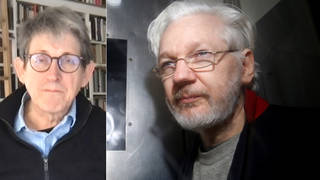
By Amy Goodman with Denis Moynihan
The Obama administration’s espionage case against alleged CIA whistleblower Jeffrey Sterling is expected to come to trial soon, six years after he was indicted. In addition to Sterling, also on trial will be a central pillar of our democratic society: press freedom.
Federal prosecutors allege that Sterling leaked classified information to New York Times reporter and author James Risen. Risen has written many exposés on national security issues. In one, published in his 2006 book “State of War,” he details a failed CIA operation to deliver faulty nuclear bomb blueprints to the government of Iran, to disrupt that country’s alleged weapons program. Federal prosecutors think Sterling leaked the details of that operation to Risen. They want Risen to divulge his source in court, which he has so far refused to do, asserting the First Amendment’s protections of the free press. James Risen has vowed to go to jail rather than “give up everything I believe in.”
The role confidential sources play in investigative journalism was perhaps best demonstrated by journalists Bob Woodward and Carl Bernstein. They had a confidential source dubbed “Deep Throat,” who gave them leads, confirmed details, and instructed them to “follow the money.” With the help of that source, they uncovered wrong-doing at the highest levels of government that ultimately led to the President Richard Nixon’s resignation from office in 1974, to avoid impeachment.
At about the same time, revelations about FBI, CIA and the NSA misconduct and outright criminality led to Congressional investigations that prompted creation of new laws, like the Foreign Intelligence Surveillance Act (FISA), which was supposed to rein in abuses, requiring a court-issued warrant for surveillance.
Then, 9/11 happened, and, as common wisdom now holds, “everything changed.” The administration of George W. Bush initiated a wide spectrum of activities, including torture, kidnapping, warrantless wiretapping, and, of course, the invasion and occupation of Iraq based on falsified intelligence and a sprawling propaganda initiative, conducted with a largely compliant mass media.
These abuses came to light thanks to the work of investigative journalists like Risen, and to whistleblowers who take great risks, personally and professionally, to bring abuses of power to public attention. Risen has taken his case to court, where a Federal district judge threw out the subpoena against him. The Fourth Circuit Court of Appeals, which, importantly, has jurisdiction over Virginia and Maryland, where the CIA and NSA are headquartered, respectively, reinstated the subpoena. The U.S. Supreme Court, at the Obama administration’s urging, failed to hear the case. Risen has thus exhausted his legal appeals, and will either have to testify in Sterling’s trial, or face contempt of court charges, which can include massive fines and jail time.
“As long as I’m attorney general,” U.S. Attorney General Eric Holder promised, “no reporter who is doing his job is going to go to jail.”
If Sterling’s federal prosecutors compel Risen to testify, it’s not clear what Holder’s promise will be worth.
One of the reasons that the district court judge threw out the subpoena against Risen is that, the judge reasoned, the prosecutors already have a strong case against Sterling, and they don’t need Risen’s confirmation that Sterling was the source. The case against Sterling includes Risen’s credit card and bank statements, telephone records, and other information allegedly linking the two. Therein lies another profound threat to journalism: the unprecedented level of surveillance happening. Ironically, it was James Risen and his colleague Eric Lichtblau who first exposed the Bush administration’s warrantless wiretapping program, in an article written in 2004 but withheld until after the 2004 presidential election by then-executive editor Bill Keller.
Human Rights Watch and the American Civil Liberties Union jointly released a report in July, “With Liberty to Monitor All: How Large-Scale U.S. Surveillance is Harming Journalism, Law, and American Democracy.” In detailing the negative impacts on journalism by mass surveillance, they quote Brian Ross, chief investigative correspondent for ABC News, who said, “I feel … like somebody in the Mafia. You’ve got to go around with a bag full of quarters and, if you can find a pay phone, use it, or, like drug dealers use, [a] throwaway burner phones. These are all the steps that we have to take to get rid of an electronic trail. To have to take those kind of steps makes journalists feel like we’re criminals and like we’re doing something wrong.”
Of course, investigative journalists are not guilty of doing something wrong. The online activist group Roots Action has petition with more than 125,000, calling on President Barack Obama and Attorney General Holder to halt legal action against James Risen. Scores of press freedom organizations have publicly supported Risen, as have 20 Pulitzer Prize winners. A crack down on the press ultimately violates the public’s right to know.
There is a reason why journalism is protected by the U.S. Constitution: A free press is an essential check and balance, necessary to hold those in power accountable. Journalism is essential to the functioning of a democratic society.
Listen and share Amy Goodman’s weekly podcast on SoundCloud.











Media Options